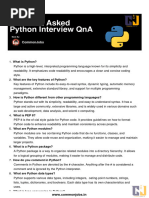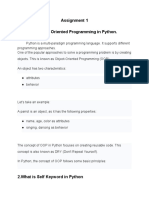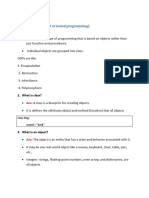0 ratings0% found this document useful (0 votes)
5 viewsOops in Python
Uploaded by
Abhishek RathoreCopyright
© © All Rights Reserved
Available Formats
Download as DOCX, PDF, TXT or read online on Scribd
0 ratings0% found this document useful (0 votes)
5 viewsOops in Python
Uploaded by
Abhishek RathoreCopyright
© © All Rights Reserved
Available Formats
Download as DOCX, PDF, TXT or read online on Scribd
You are on page 1/ 1
1.
What is the difference between class variables and instance
variables in Python?
o Answer: Class variables are shared across all instances of a
class, while instance variables are unique to each instance.
Class variables are defined within the class but outside any
methods, whereas instance variables are usually defined
within methods and prefixed with self.
2. Explain the concept of inheritance in Python.
o Answer: Inheritance allows a class (child class) to inherit
attributes and methods from another class (parent class). This
promotes code reuse and establishes a relationship between
classes. Python supports single, multiple, multilevel, and
hierarchical inheritance.
3. What is polymorphism in Python, and how is it
implemented?
o Answer: Polymorphism allows objects of different classes to
be treated as objects of a common superclass. It is
implemented through method overriding (where a child class
provides a specific implementation of a method already
defined in its parent class) and method overloading (achieved
through default arguments).
4. How does encapsulation work in Python?
o Answer: Encapsulation restricts access to certain components
of an object, which is achieved using private and protected
access modifiers. Private members are prefixed with double
underscores (__), and protected members are prefixed with a
single underscore (_).
5. What are metaclasses in Python, and why are they used?
o Answer: Metaclasses are classes of classes that define how
classes behave. They allow customization of class creation
and can be used to enforce certain constraints or modify class
attributes and methods dynamically. Metaclasses are defined
by inheriting from the type class.
You might also like
- 300 Python Interview Questions and Solutions100% (1)300 Python Interview Questions and Solutions88 pages
- Python Interview Questions For Freshers - Docx 1No ratings yetPython Interview Questions For Freshers - Docx 16 pages
- Object-Oriented Programming (OOP) Interview_QuestionsNo ratings yetObject-Oriented Programming (OOP) Interview_Questions10 pages
- Top 25 Python Programming Viva QuestionsNo ratings yetTop 25 Python Programming Viva Questions4 pages
- Elaborate All Questions From First to Last on Firs...No ratings yetElaborate All Questions From First to Last on Firs...4 pages
- 100 Most Asked Python Interview QnA PDFNo ratings yet100 Most Asked Python Interview QnA PDF10 pages
- Python Interview Questions and Answers for FreshersNo ratings yetPython Interview Questions and Answers for Freshers7 pages
- python programming question bank unit wise by Rupesh ✓No ratings yetpython programming question bank unit wise by Rupesh ✓24 pages
- Python Questions for Cloudy Coders DriveNo ratings yetPython Questions for Cloudy Coders Drive28 pages



























































